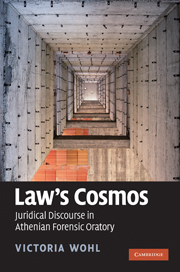Preface: before the law
Published online by Cambridge University Press: 07 September 2010
Summary
“I don't know this Law,” said K. “All the worse for you,” replied the warder.
Kafka The TrialAthenian law is a notorious historical dead end. Unsystematic, with no formal legal theory, no unified lawcode, no written verdicts or system of precedent, it falls off the map of Western jurisprudential history, whether common law or civil. Both as forensic practice and as jurisprudential philosophy it is “before the law” as we know it, an evolutionary oddity. The subject of this book is neither the practice nor the philosophy of Athenian law, but something between the two, the juridical discourse generated by and embedded in the courtroom speeches of the fifth and fourth centuries bce. These texts, as I hope to show, offer complex (though not necessarily coherent) meditations on law and justice. They create and sustain a juridical world-view and a juridical world, a world not completely segregated from its surrounding cultural environment, of course, but recognizably distinct in its rules, logic, and structure. While Athens' legal practice may be deemed an irrelevant detour on the path of jurisprudential history, Athenian legal discourse, I suggest, is an important part of that history, offering an early example of a developed, if unsystematic and largely latent, body of jurisprudential thought and a self-consciously juridical relation to life.
This book is not a quest for origins although, as Derrida has remarked, that is one temptation created by the law's apparent resistance to history. Instead it is the archaeology of a neglected site of legal knowledge.
- Type
- Chapter
- Information
- Law's CosmosJuridical Discourse in Athenian Forensic Oratory, pp. ix - xivPublisher: Cambridge University PressPrint publication year: 2010



